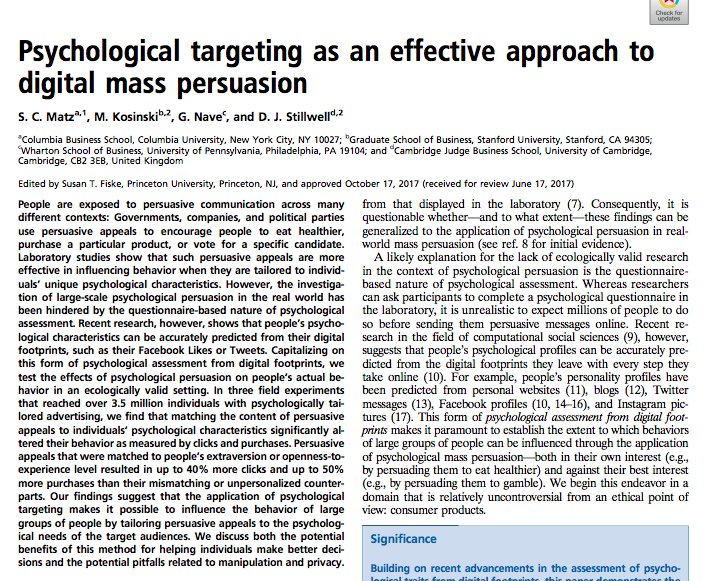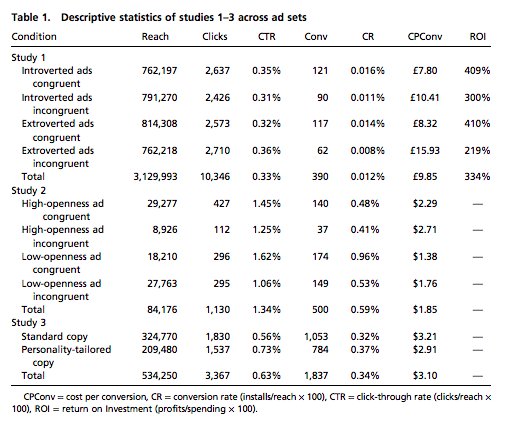After violating a moral norm, people have an increased likelihood to act prosocially. Can you provide an outlet for the good behavior? Can you remind people of previous bad deeds to encourage a good deed?
#Convert2Good #advent 1/24
We see our actions as more prosocial if we regard ourselves as part of a group with a good prosocial record. Even onlookers do. Be careful about how you talk about group membership.
#Convert2Good #advent 2/24
Social exclusion reduces a wide range of prosocial behaviors. It increases aggression, risk taking & procrastination and reduces cooperation and analytical reasoning. Can users feel included or excluded in your system? What cues exist?
#Convert2Good 3/24
If breaking a rule is perceived to be for a greater good, people tend to regard it as a positive. However, people tend to follow unethical requests, while strongly over-estimating their ability to do disobey.
#Convert2Good #advent 4/24
The tendency to judge a harmful action as worse than an equally harmful inaction. How is inactivity handled in your system? What are your default settings?
(link.springer.com/article/10.100…)
#Convert2Good #advent 5/24
People shape their behaviour after moral norms, so try to invoke those if you can. Try just asking people to consider what a moral action would be.
Dr. Sreedhari Desai have some more specific nudges:
rework.withgoogle.com/blog/nudge-peo…
#Convert2Good #advent 6/24
Feelings of awe increase ethical decision making, generosity and prosocial behavior. Can your product amaze your users enough? Can you reach them at a moment of awe?
Bonus insight: Awe creates a perception of having more time available.
#Convert2Good #advent 7/24
Individuals are less likely to take action in an emergency the more other people are present. Can you clarify responsibility in your system? Can you reduce the perception of bystanders?
spmoodle23.aisgz.org/pluginfile.php… …
ethz.ch/content/dam/et… …
#Convert2Good 8/24
Positive and negative moods can both increase and decrease prosocial behavior. Pay attention to the mood of your users and rigorously check your assumptions.
#Convert2Good 9/24
ei.yale.edu/wp-content/upl…
Rewarding a behavior might reduce intrinsic motivation to do the behavior. This might lead to an long-term reduction in the reinforced behavior. Do you tie positive outcomes to individual actions?
princeton.edu/~rbenabou/pape…
#Convert2Good #advent 10/24
People always look to affirm their identity positively. Refer to identity rather than actions to make people take a positive action. For example, praise your kid for being a "helper" rather than "for helping".
#Convert2Good #AdventCalendar 11/24
New community members often start by contributing in simple or low-risk ways. People are more likely to help in an emergency if bystanders are able to assist if necessary. Can your users contribute on different levels?
#Convert2Good 12/24
Mood is contagious in both offline and online systems. Knowing mood affects likelihood to behave in a prosocial way, what is it like in your system? Can you influence the group mood?
Notorious Facebook mood exp: pnas.org/content/111/24…
#Convert2Good 13/24
Inducing guilt can increase pro-social acts and charitable giving, but if too strong it can lead to an counter-arguing effect. If people can't find prosocial relief, they might use less adaptive solutions like self-punishment. A dark pattern?
#Convert2Good 14/24
Cues about religion is a robust way of increasing pro-social behavior with religious users. A potential drawback to be aware of is that it can increase racial prejudice, and might be limited to other members of the same religion.
#Convert2Good #Advent 15/24
The hypothesis that people help others out of empathy in ways that can't be explained by self-interest. Consider if you at all need to provide an instrumental reward to motivate contributions.
victorkumar.org/uploads/6/1/5/…
#Convert2Good 16/24
Past good deeds can make people feel liberated to take less prosocial actions. Focus on rewarding commitment and consistency. Be careful about how you frame previous actions.
#Convert2Good #Advent 17/24
People seek relief from negative moods, and this drives prosocial behavior towards others in need. This is a competing model to the empathy-altruistic hypothesis and aims to explain prosocial acts without relying on altruism.
#Convert2Good 18/24
People with a high fear of other's judgment are less likely to take any action in social situations. Can you create both social and non-social paths to contribute in your system?
#Convert2Good #AdventCalender 19/24
People tend to value a reward now higher than an equal reward in the future. This also works in reverse: a donation now is a bigger request than an equal donation in the future.
#Convert2Good #AdventCalendar 20/24
A tendency to answer survey and interview questions in a socially desirable way. Quite a few techniques exists to mitigate this, including asking indirect questions, using a social desirability scale, or increasing cognitive load.
#Convert2Good 21/24
To mistakenly believe most others hold a different opinion or belief than you. For example, people believe others are less concerned with avoiding embarrassment than they actually are.
psycnet.apa.org/record/1987-34…
#Convert2Good #AdventCalendar 22/24
People tend to feel increased well-being and behave more prosocially after a competitive win. However, for a win achieved with the help of others the effect is even stronger. Have you helped anyone win recently?
ac.els-cdn.com/S0022103117301…
#Convert2Good #Advent 23/24
People tend to use 1 of 7 techniques to excuse their immorality: Moral justifications, Euphemistic labelling, Advantageous comparisons, displacement/diffusion of responsibility, misrepresenting consequences or dehumanization
Merry Xmas! #Convert2Good 24/24
The wikipedia page is ok:
en.wikipedia.org/wiki/Moral_dis…
Albert Bandura discussing Moral Disengagement:






